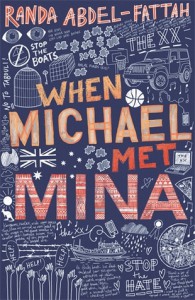

SUMMARY
Follows the interactions between an Afghani refugee and the son of the leaders of a burgeoning political party against immigration ‘queue jumpers.’
PLOT
Michael meets Mina at a protest and later realises they share classes as school. As they clash, Michael learns that he doesn’t have to believe what his parents teach him, and that Mina faces certain persecutions just by being a non-Australian. To be honest, the book is quite light on plot, it’s mostly dedicated to the romance the two share, and Michael’s character arc. For some unknown reason they keep their relationship a secret.
CHARACTERS
There’s not much to say about Mina. She doesn’t really have a character arc. She’s mostly there to be the sympathetic boat person who teaches Michael that he can have independent thought. She’s smart and competitive enough for a scholarship to a prestigious college and her life is filtered through her experiences as a refugee, arriving in Australia by boat and spending time in detention before granted a refugee visa. She’s a very sympathetic character.
Michael is the other protagonist, and he starts out uncertain if he supports his parents beliefs in ‘Aussie Values’. Unfortunately his parents have quite a skewed world view and believe, for example, that if Mina attends Victoria College, her parents must be rich, when in reality they aren’t and Mina attends on a scholarship. Michael learns not to jump to these same conclusions, such as if a refugee can afford passage on an illegal boat, they can’t be that poor and shouldn’t be trying to leave their own country. I really would have liked the argument raised against Michael’s parents view that most illegal immigrants are Westerners (from the UK/US etc) overstaying their visas, not asylum seekers looking to ‘jump the queue’, but this didn’t happen. Instead it mostly tried to dispel the belief that refugees jump some kind of imaginary queue.
WRITING
I did have a bit of trouble differentiating between both the characters’ voices. They sounded almost identical. I kept having to flip back to the start of the chapter to check the name.
One of my favourite things was watching how the media loved to hype everything up and then not declare a side. Journalistic integrity is something of the past. The media fuelled the hate more than the political organisation did.
One issue I had with the book was right at the end, Mina says about Michael, "He's taught me to never give up on anybody.” I found it hugely hypocritical that Terrence didn’t get the same treatment, especially since he and Michael started out at the same place, although Terrence was vilified throughout the whole novel and Michael wasn’t. Everyone ended up giving up on Terrence, even his long-time crush.
PACING
The pacing was pretty good – at least, I enjoyed the book a lot, thought about it when I wasn’t reading it, and was dead keen to get back to reading it. Despite its lack of real plot, the conflicts moved the narrative forward and I felt like the pace was kept high – I never knew what was around the corner and I was eager to find out.
OVERALL
Although light on plot, this book explores a very serious and timely conflict for Australians and other people living in privileged parts of the world. I never felt like I was being preached to by either side of the debate, although it was obvious whose side we were meant to be on, and I found Michael’s parents and their organisation to be more of an excuse for the more radical characters to act out. Although Mina didn’t change all that much, Michael had a fantastic character arc coming to terms with his own beliefs. I really enjoyed this novel and highly recommend it to other contemporary YA lovers.
I received this book for free from Pan MacMillan in exchange for an honest review. This does not affect my opinion of the book or the content of my review.

 7
7




